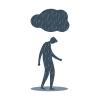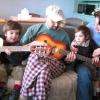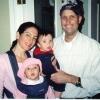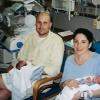Blog
Our blog covers a wide range of topics to help support, inspire, and inform members of our community, including those who have been personally impacted by cancer. Use the search filters below to find blog posts on topics that are important to you, from wellness tips, advocacy & policy news, and cancer research findings to stories and insights shared by patients, survivors, and caregivers.

Parenting My Grieving Children
Grief comes in waves, in ebbs and flows, even for three-year old toddlers. That first year without Brett was a pendulum of conversation, reasoning, and tears. But there’s nothing easy or linear about parenting, let alone parenting grieving children. I learned not to expect too much from myself or from them.

The Reality of Grief
When at last Brett died, I expected peace, not chaos all over again. I'd buried him prematurely in my dreams throughout his illness, bracing myself, I suppose, for the inevitable. Now that he was truly gone though, I was unprepared for the tidal wave of grief within me. The first few months after Brett died were a blur.

Predictors of Social Function and Feelings of Isolation Among Metastatic Breast Cancer Survivors
The Research & Training Institute recently presented findings from the Cancer Experience Registry at the San Antonio Breast Cancer Symposium based on data from 273 Metastatic Breast Cancer patients and survivors.

Cancer-Related Distress and Unmet Needs Among Acute Myeloid Leukemia (AML) Survivors
The Cancer Support Community shares important information about the relationship between psychosocial distress and unmet needs, as well as some suggestions about how best to provide AML patients and survivors with supportive care.

A Beautiful Death
The toll of Brett's cancer on his body made home hospice no longer a viable option. After his most recent seizure, he was admitted into hospice. Going into hospice was almost a relief. I lived with premature anticipatory grief for years knowing Brett's cancer was incurable.

Caregiver's Perspective: Shifting Moments
Being Brett’s wife and caregiver was a complicated role, and it strained my nerves. It was hard to simply rest my head on his shoulder the way I used to, or to express my own need for emotional intimacy and comfort when the gravity of his illness loomed large. I bounced back quickly from hurt feelings because there was no choice but to be present when we our time together as a family was diminishing. Every moment mattered.

Utilization Management: What Patients Need to Know
One of the major themes dominating health care discussions today is the fact that healthcare costs in the United States are proving unsustainable. Practices known as utilization management (UM) are one of the major ways the high cost of health care has been addressed. The Cancer Policy Institute at the CSC will be releasing a series of blogs aimed at educating patients about different UM practices and techniques. The upcoming blogs will contain information that patients need to know, including how that particular technique impacts access to care, as well as advocacy opportunities to address those barriers to care. Read this first blog in the series to learn more about UM, the different practices and techniques, and how CSC is fostering conversations about UM.

Out of Options
Six years into her husband's cancer diagnosis, Nancy Sharp felt cancer's toll on their marriage and children. Like many caregivers, she learned to cope and adapt, even as Brett's brain tumor progressed and treatment options failed.

Caregiver’s Remorse
Nancy Sharp was a new mother wanting to go on her first family vacation with her husband and twins, but even that isn't so simple when you're a cancer caregiver.

For Cancer Caregivers, Even Nanoseconds Count
For cancer caregivers, life is lived even down to the nanosecond. Time for me has become less a measurement of the day than the minutes.